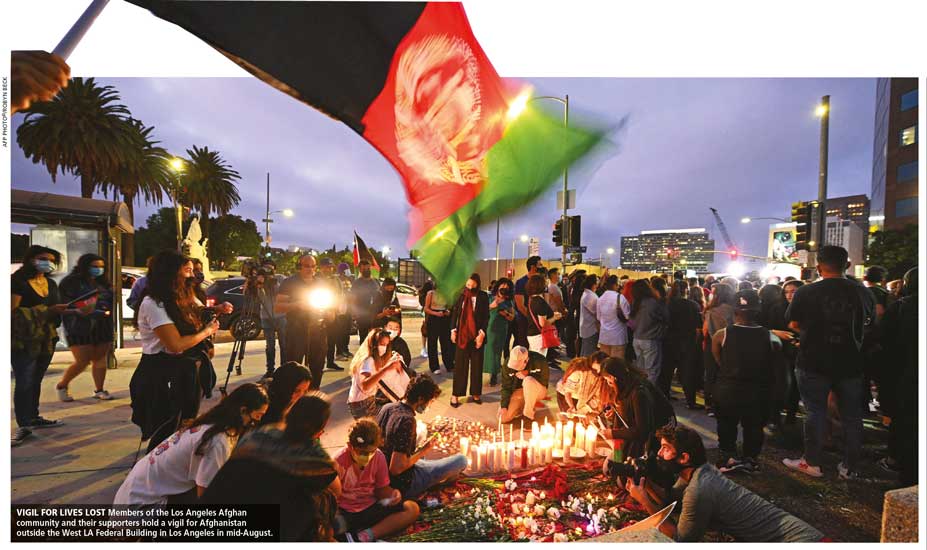TALIBAN TAKEOVER
A NEW ERA HAS DAWNED FOR AFGHANISTAN
Saro Thiruppathy reviews the present situation for Afghans under Taliban rule and early efforts to govern them in a less repressive manner

The Afghan crisis briefly displaced COVID-19 in the minds of many; they watched in horror as heartrending images of events at Kabul’s Hamid Karzai International Airport flashed on their TV screens.
People were fleeing the rapid takeover by the Taliban after the US-backed government crashed as the last of the American troops were leaving.
Right-wing America was quick to throw the book at President Joe Biden for the tragedy due to the apparently sudden withdrawal. But in fact, plans to end the 20 year long occupation of Afghanistan had been set in motion by former president Donald Trump.
PLANS TO WITHDRAW The lead up to this event began in 2017 when the Taliban wrote an open letter to Trump, urging him to withdraw US troops from Afghanistan. Discussions took place through the good offices of the Qatari government in Doha, and the Doha Agreement was signed on 29 February 2020 by the Americans and the Taliban.
Under this deal, the US agreed to withdraw its troops from Afghanistan by 1 May 2021 if the Taliban entered into a peace agreement with the Afghan government.
The Americans also agreed to release 5,000 Taliban prisoners who were being held by them. In turn, the Taliban promised to stop terror groups such as ISIS and al-Qaeda from using the country as a base from which to attack the United States and its allies.
Interestingly, the US never declared the Taliban as a foreign terrorist organisation. According to the Americans, a foreign group must engage in terrorism and threaten the national security of the US or its nationals. Even though the Taliban fit this definition, the US didn’t apply a terror label so that it could leave room for diplomatic engagement with them and the Afghan government.
Biden claims he was bound to keep to the timelines of the agreement or risk more conflict with the Taliban but he did push the withdrawal date back to 31 August. So Biden wasn’t in that great a bind that he couldn’t rewrite some of the fine print and prevent the chaos that ensued.
JOYFUL AND SORROWFUL By the time the last US flight departed Kabul Airport on 30 August, the words of a Taliban fighter summed up their emotions best: “The last five aircraft have left. It’s over. I cannot express my happiness in words… Our 20 years of sacrifice worked!”
So while the Taliban was speechless with joy, the blame game began in the US with Trump criticising Biden’s disorderly withdrawal. Biden responded by saying that Trump had actually emboldened the Taliban and left it “in the strongest position militarily since 2001.”
Meanwhile, the Afghan people who have suffered since 1979 at the hands of the Russians, the Mujahideen, the Taliban and the US are the ultimate victims of these power struggles. And now, the Taliban is back in power and the world doesn’t know whether it’s going to be quite as repressive as before or a little more moderate.
The jury is still out on that prospect but the so-called interim government of the Islamic Emirate of Afghanistan is trying to appear more conciliatory as long as people conform to Islamic law.
Its concept of Islamic law is nebulous and can apply to anything the Taliban sees fit. The violation of women’s rights dominates the areas of employment, movement, dress code and politics as is seen in the conspicuous absence of women ministers.
Then surprisingly, the Taliban announced that women will be allowed to obtain a university education but would have to study in gender segregated classrooms and be taught by female professors or senior professors with a good reputation.
This concession must be a relief to those Afghan women who don’t wish to remain barefoot and pregnant all their lives, and prefer to seek cerebral enhancement instead.
Nevertheless, the core culture of the Taliban, which is yet underdeveloped, was evident in the new higher education minister’s observation that “universities and degrees have no importance” when compared to the religious scholars of the Taliban.
In the meantime, the UN Security Council adopted a resolution demanding that Afghanistan not be used to threaten or attack any nation, or shelter terrorists. Russia
and China abstained from voting.
CAUTIOUS ENGAGEMENT Countries such as Qatar, China, Pakistan, Iran, Turkey and Russia are hoping to build relations with the new government. Due to the operations of al-Qaeda and ISIS-K, Pakistan is keen to garner Taliban support to ensure that they aren’t allowed to operate out of Afghanistan.
Though China backed the US invasion in 2001, Beijing believes that the new version of the Taliban is more moderate; in fact, the People’s Daily even credited the Taliban’s victory to being similar to China’s own ‘people’s war.’
Russia, which had fought a bitter war with the Mujahideen for nine years, is also watching events unfold. Its diplomats have described the Taliban as “normal guys” and claim that Kabul is far safer now than before. Moscow is not averse to engaging with the Taliban and President Vladimir Putin’s attitude is pragmatic in that the takeover is a reality that has to be accommodated.
Perhaps the future will see a mix of concessions and compromise, for both the people of Afghanistan and the world – because ultimately, it’s the Afghans themselves (rather than a bunch of foreign invaders) who are now leading their country once more.
The Afghan people who have suffered since 1979 at the hands of the Russians, the Mujahideen, the Taliban and the US are the ultimate victims




